Getting food in Gaza has become “like the Hunger Games”
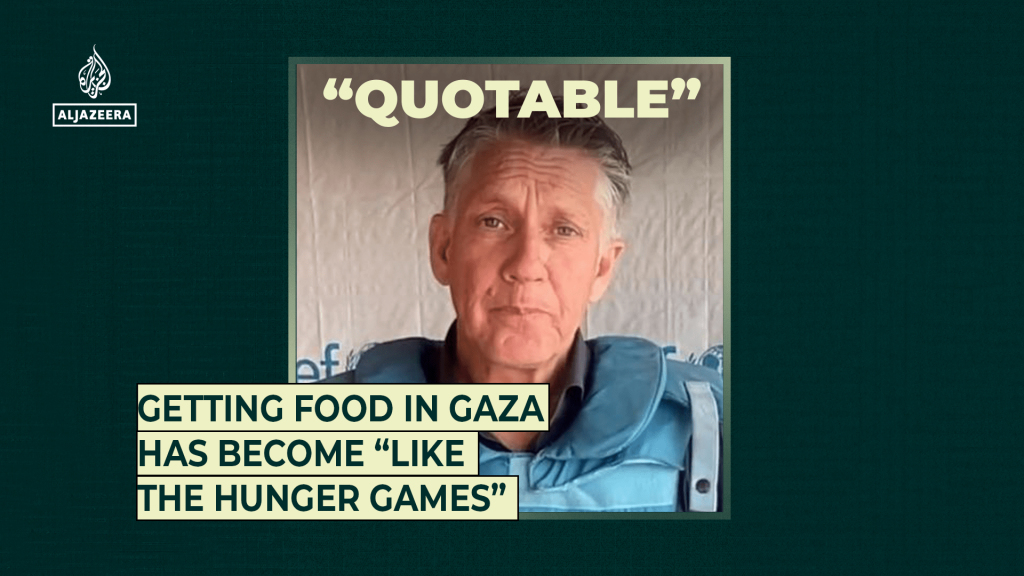
James Elder, UNICEF spokesperson, warns of deadly risks Palestinians face seeking aid in Gaza and calls for urgent safe access. James Elder, a UNICEF spokesperson for, explains the potentially deadly conditions awaiting Palestinians trying to reach aid in Gaza and the urgent need for safe aid access. Adblock test (Why?)
World reacts to Trump’s travel ban, hits several nations mired in conflict
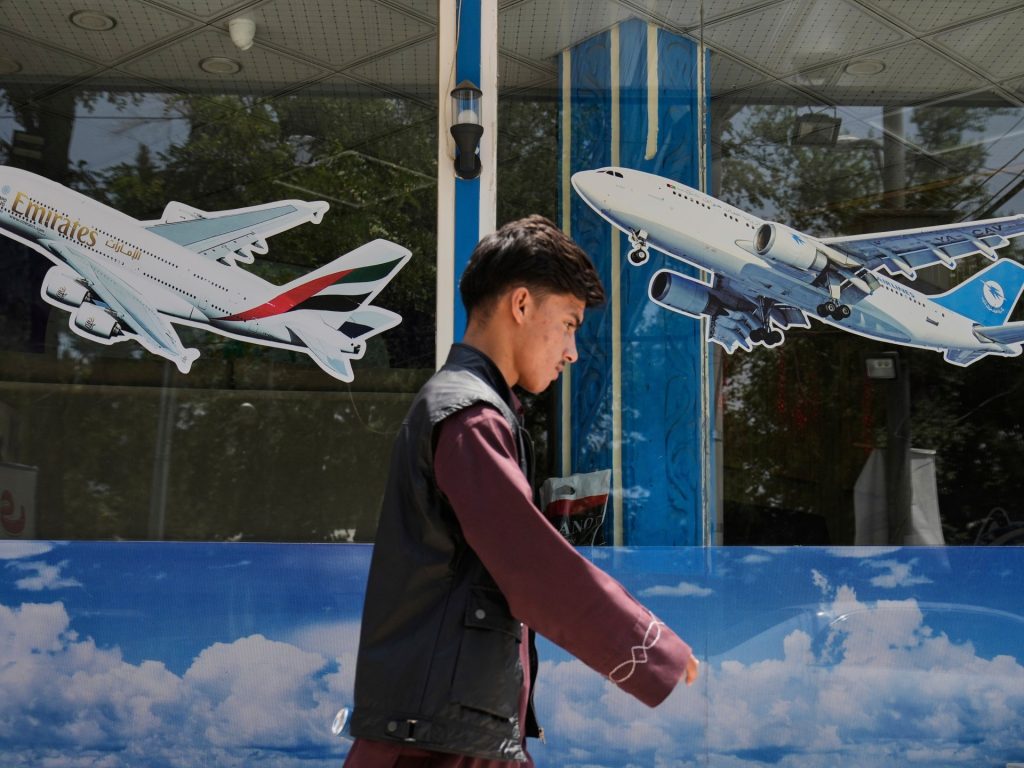
Donald Trump has signed an executive order banning citizens from 12 countries from entering the country in a move he said was to protect the US from “foreign terrorists”, mirroring a contentious policy from his first term as United States president. As part of Trump’s intensified crackdown on immigration, a cornerstone of his previous time in the White House and on the campaign trail, he announced on Wednesday that nationals from 12 countries – Afghanistan, Myanmar, Chad, Congo, Equatorial Guinea, Eritrea, Haiti, Iran, Libya, Somalia, Sudan and Yemen – will be banned. Seven countries will also be subject to partial restrictions, which will mean they will no longer be able to apply for immigrant or non-immigrant temporary visas. However, some temporary work visas will still be allowed. Trump cited an attack in Boulder, Colorado, where a man threw a petrol bomb into a crowd of pro-Israel demonstrators, as proof of the need for immigration curbs. “The recent terror attack in Boulder, Colorado, has underscored the extreme dangers posed to our country by the entry of foreign nationals who are not properly vetted,” Trump said in a video message from the Oval Office posted on X. Advertisement “We don’t want them,” he added. On June 1, police arrested a man who threw Molotov cocktails towards a group of people attending a rally for the release of captives taken from Israel on October 7, 2023 and held in Gaza. Suspect Mohamed Sabry Soliman was charged with a federal hate crime, as well as an array of state charges, according to an affidavit by the US Department of Justice. Soliman is an Egyptian national who has also lived in Kuwait. Neither of these countries, both of which the US has strong, long-term relations with, are on Trump’s list of banned countries. This latest travel ban follows Trump’s executive order during his first term, in which he banned nationals from seven Muslim-majority countries, also known as the “Muslim ban,” in 2017. Seven of the countries on the new list of those banned also have Muslim-majority populations and several are beset by ongoing conflicts. Despite the new suspensions, the ban will not apply to existing visa holders, foreign diplomats, athletes and their teams, among other exemptions. The ban is expected to come into effect on June 9 at 12:01 am EDT (04:01 GMT). Here’s how the world has reacted to the ban. African Union The AU, which has seven of the 12 nations on the travel ban list, said the ban would harm “people-to-people ties, educational exchange, commercial engagement, and broader diplomatic relations” that were built with the US over past decades. “The African Union Commission respectfully calls upon the USadministration to consider adopting a more consultative approach and to engage in constructive dialogue with the countries concerned,” the bloc said in a statement. Advertisement Oxfam America President of Oxfam America, Abby Maxman, said the decision was not about “national security”. “It is about sowing division and vilifying communities that are seeking safety and opportunity in the United States,” Maxman said. Somalia The Somali ambassador to the US, Dahir Hassan Abdi, said in a statement that Mogadishu “values its longstanding relationship with the United States”. “[Somalia] stands ready to engage in dialogue to address the concerns raised,” Abdi said. Venezuela Interior minister Diosdado Cabello described the ban as a “great risk for anyone, not just Venezuelans”. “They persecute our countrymen, our people, for no reason,” he said. Venezuelan migrants in the US have been targeted by the Trump administration for deportation to El Salvador, many on unproven allegations of being gang members. Adblock test (Why?)
Trump speaks with China’s Xi amid trade, student visa tensions
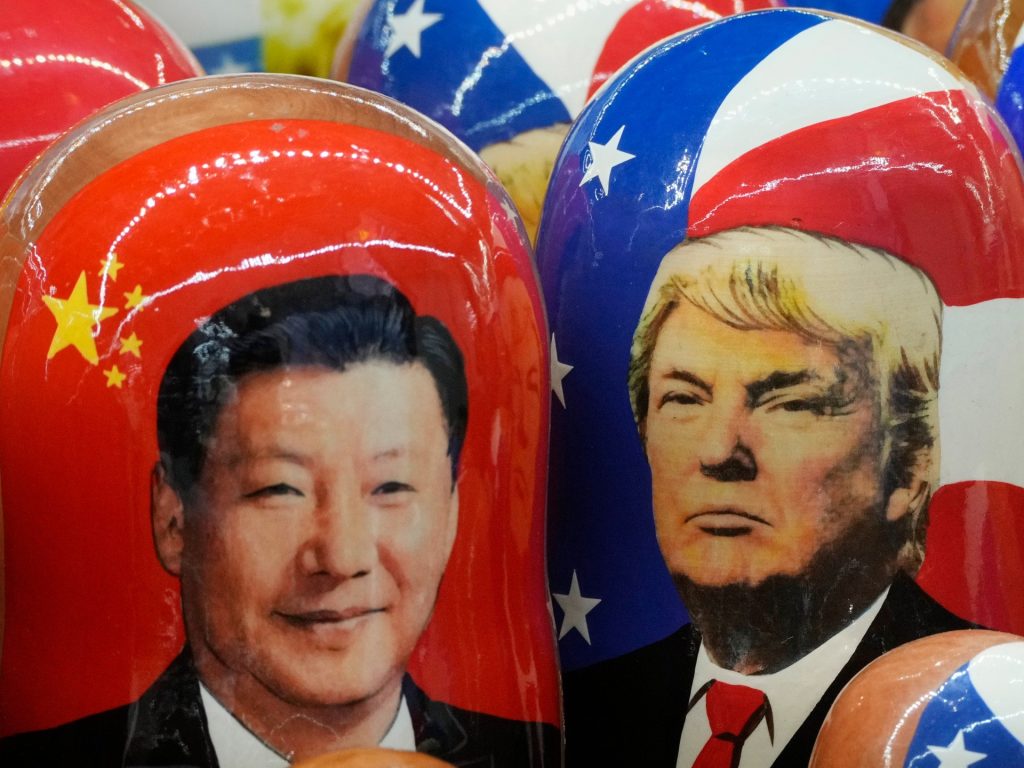
US president previously said it was ‘hard to make a deal’ with the Chinese leader as talks continue over trade. United States President Donald Trump has spoken with Chinese President Xi Jinping by phone as the two countries continue to clash over trade relations, which Trump has sought to aggressively reshape through a series of tariffs. The Chinese state media outlet Xinhua reported that the phone call on Thursday took place at the request of the US. Trump had said the day before that reaching a deal with China was proving difficult. In the first readout of the call, Trump posted on his social media site, Truth Social, “I just concluded a very good phone call with President Xi, of China, discussing some of the intricacies of our recently made, and agreed to, Trade Deal. The call lasted approximately one and a half hours, and resulted in a very positive conclusion for both Countries.” “There should no longer be any questions respecting the complexity of Rare Earth products. Our respective teams will be meeting shortly at a location to be determined. During the conversation, President Xi graciously invited the First Lady and me to visit China, and I reciprocated,” he added. Advertisement Trump also noted the conversation was focused almost entirely on trade and that neither the Russia-Ukraine war nor the Iran nuclear talks were mentioned. On Wednesday, Trump had posted: “I like President XI of China, always have, and always will, but he is VERY TOUGH, AND EXTREMELY HARD TO MAKE A DEAL WITH!!!”. For his part, Xi was quoted by Chinese State TV as saying after the call Thursday, the two countries should strive for a win-win outcome and that dialogue and cooperation are the only right choice for both. The two sides should respect each others’ concerns, he added. Xi also stressed that the US should handle the Taiwan issue very “carefully”. China and the US reached a 90-day agreement on May 12 to bring down tariffs amid a trade war initiated by the Trump administration, but tensions have remained high since then. Washington imposed significant tariffs on Beijing, but eventually eased off amid concerns about the potential economic fallout of a sustained trade war between the world’s two largest economies. Critics have accused Trump of causing enormous disruptions in the global economy and then backing down when China or the European Union hit back forcefully. The Trump administration has also launched a crackdown on Chinese international students living in the US, threatening to revoke student visas of those associated with the Chinese Communist Party or who the government claims pose vaguely defined threats to US national security. More than 277,000 Chinese students were enrolled in US universities during the 2023-2024 academic year. Advertisement China said such steps, along with others targeting China’s technology sector, violate the temporary trade truce reached with the US in May. “These practices seriously violate the consensus,” the Ministry of Commerce in Beijing said in a recent statement. While disputes between Washington and Beijing over issues such as trade and technology have been a common feature of their relations for decades, these tensions have ratcheted up as Trump sets out to change what he sees as a global imbalance of commercial exchange between the US and other countries, including China. Adblock test (Why?)
Trump’s new travel ban: What we know
[unable to retrieve full-text content] US President Donald Trump has signed a travel ban blocking entry to the US for nationals of 12 countries.
Netherlands still backs Israeli F-35 ‘supply chain of death’: Report
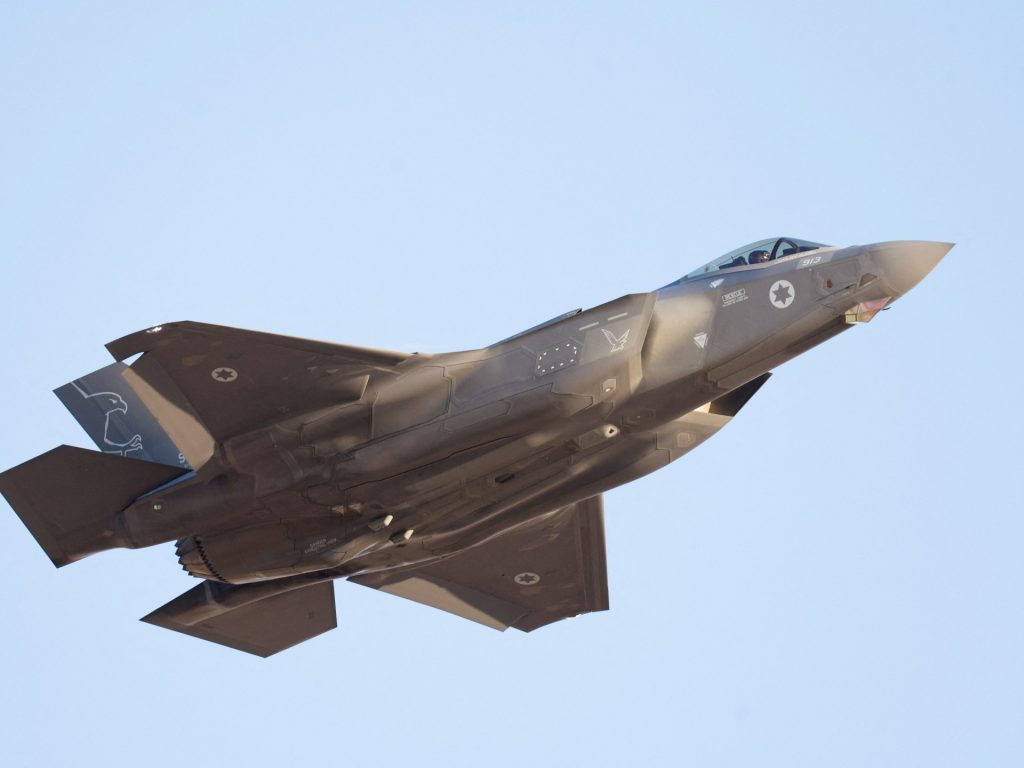
The Netherlands is still supporting the supply chain of Israel’s version of the F-35 fighter jet, more than a year after a court banned direct Dutch exports of F-35 parts to Israel, a report claims. Research by the Palestinian Youth Movement (PYM) shared with Al Jazeera shows that the port of Rotterdam is frequented by ships carrying F-35 parts for maintenance and assembly. The ships belong to the Danish shipping giant Maersk. By examining import data and shipping receipts of Maersk and Lockheed Martin – the United States weapons manufacturer that designed the F-35 – the group found that more than a dozen shipments from Israel travelled through the port of Rotterdam on their way to the US from April 2023 until early 2025. The F-35 fighter jet has been used by Israel to bomb Gaza from the air with devastating effect. Much of the Strip, where more than 50,000 people have been killed since October 2023, is in ruins. “Maersk now operates a recurring shipping cycle between Lockheed Martin’s Fort Worth facility in Texas and Israel Aerospace Industries in Israel, routed through Rotterdam,” the report stated. “In this cycle, Maersk transports pairs of empty F-35 wing containers from Houston to Ashdod, Israel, where they are loaded with completed F-35 wings. The filled containers are then shipped back to the US for final assembly or repair.” Advertisement The researchers noted that Rotterdam is a “key stopover point in this process, and shipments for this cycle have occurred beyond February of 2024”. Then, a judge at a Dutch appeals court ordered the Netherlands to stop exporting and transiting F-35 parts to Israel, saying there was a “clear risk” they were being used in “serious violations of international humanitarian law”. The Dutch state immediately lodged an appeal at the Supreme Court, but until a decision is made, it is still bound by the lower court’s ruling. “The findings in the report show that the port of Rotterdam plays an important role in sustaining the operational capacities of Israel’s F-35 fighter jets. This way, the port of Rotterdam is complicit to international law violations in Gaza,” Gerard Jonkman, director of a Dutch NGO, The Rights Forum, told Al Jazeera. The Dutch Foreign Ministry told Al Jazeera that the court had subsequently confirmed that the judgement in February 2024 applied only to the export or transit of F-35 parts from the Netherlands to Israel and that the Dutch state had implemented the judgement accordingly. A spokesperson for the port of Rotterdam told Al Jazeera that the Dutch Ministry of Foreign Affairs was responsible for issuing permits for the transhipment of military goods. Port officials check vessel compliance with environmental and safety regulations for shipping on behalf of the government and municipality of Rotterdam, they said. “The harbour master receives only limited information regarding vessel cargo. The information received mainly pertains to whether the vessel is carrying hazardous substances. Other aspects of vessel cargo are monitored by various other public authorities, such as customs.” Advertisement They said they were “aware” of the February 2024 court ruling. “All activities in the port must comply with international laws and regulations and the permits issued by the government. If we see any indication that this is not the case, the Port of Rotterdam Authority alerts the competent authority.” ‘The Netherlands is still part of the supply chain’ The Rights Forum was one of three parties, together with the Dutch affiliate of Oxfam and PAX for Peace, the largest peace organisation in the Netherlands, that sued the Dutch state over its export of F-35 parts to Israel. “In this case, there is no direct export from the Netherlands to Israel, but the Netherlands is still part of the supply chain for the Israeli F-35 programme,” Gerard Jonkman, head of the Rights Forum, said of the Palestinian Youth Movement’s findings. “This way the Netherlands facilitates the Israeli F-35 programme and might breach its obligations under international law.” PAX for Peace project leader Frank Slijper told Al Jazeera: “This indeed shows that the Netherlands is part of the F-35 supply chain.” A grassroots organisation, the Palestinian Youth Movement believes that targeting Maersk directly disrupts the flow of weapons in the “supply chain of death used to genocide Palestinians”. According to the group, Maersk has shipped the wings for every Israeli F-35 since March 2022. In November 2024, following a decision by Spain to deny docking permission to two ships carrying weapons bound for Israel, Maersk adjusted its routes. The company’s fleet now avoids Spain in favour of Rotterdam and the port of Tangier in Morocco Advertisement “Maersk has, for years, knowingly supplied the Israeli military with key weapons components used to carry out genocide in Gaza,” Aisha Nizar of the Palestinian Youth Movement told Al Jazeera. “The company has done so without hesitation, potentially violating multiple arms embargo policies across Europe.” The F-35 is considered a top-of-the-line fighter jet. The aircraft designed by Lockheed Martin costs at least $80m in its most basic configuration. Currently, 12 countries operate the jet. F-35 parts are made in the United States and several participating partner countries, giving the project the moniker Joint Strike Fighter. “It is very sad to see that Maersk is not distancing itself from Israel’s crimes against humanity in Gaza and more broadly continues lending itself to the crucial replenishment of Israel’s armed forces,” Slijper said. “Shipping military supplies for the benefit of Israel’s arms industry and the [Israeli army] risks Maersk being complicit in Israel’s crimes.” The use of the jet by Israel, the only country with its unique version of the F-35, has been scrutinised since the start of the onslaught in Gaza. Recently, campaign groups took the United Kingdom government to court in a bid to halt the exports of British-made F-35 parts to Israel. In a statement to Al Jazeera, Lockheed Martin said: “Foreign military sales are government-to-government transactions, and we closely adhere to US government policy with regard to conducting business with international partners.” Advertisement Regarding
Eid al-Adha greetings in different languages

Eid al-Adha is celebrated on the third day of Hajj. Here’s how to say ‘Eid Mubarak’ in different languages. Eid al-Adha, also known as the Feast of the Sacrifice, is observed on the third day of Hajj, which falls on the 10th of Dhul-Hijja, the 12th and final month of the Islamic calendar. Eid al-Adha is the second major festival in the Islamic calendar, celebrated roughly 70 days after Eid al-Fitr, which marks the end of Ramadan, the holy month of fasting. When is Eid al-Adha? This year, the first day of Eid al-Adha falls on June 6 in Saudi Arabia and neighbouring countries, while some other countries will mark it on June 7. There are about 1.9 billion Muslims around the world, approximately 25 percent of the world population. Indonesia has the world’s highest Muslim population, with some 230 million Muslims living in the country. Pakistan is second with about 212 million Muslims, followed by India (200 million), Bangladesh (150 million) and Nigeria (100 million). What happens during Eid al-Adha? In the days leading up to Eid al-Adha, Muslims prepare by preparing their homes, buying new clothes and planning special meals for the occasion. Advertisement On the first day of Eid, those who are financially able are required to sacrifice an animal – usually a sheep, goat, cow, or camel – and distribute a portion of the meat to the less fortunate. This act commemorates the Prophet Abraham’s (Ibrahim) willingness to sacrifice his son Ishmail (Ismael) in obedience to God. The rest of the holiday is spent visiting family and friends, exchanging greetings and gifts, and sharing festive meals. Palestinians gather to celebrate alongside Muslims worldwide on the first day of the Eid al-Adha feast, at the Al-Aqsa Mosque complex in Jerusalem’s Old City, on July 20, 2021 [Ahmad Gharabli/AFP] Eid greetings in different languages The most common greeting is Eid Mubarak. The Arabic saying translates to “blessed Eid”. Here is how people say Eid Mubarak in different languages around the world. (Al Jazeera) (Al Jazeera) (Al Jazeera) (Al Jazeera) (Al Jazeera) (Al Jazeera) (Al Jazeera) (Al Jazeera) (Al Jazeera) (Al Jazeera) (Al Jazeera) (Al Jazeera) (Al Jazeera) Adblock test (Why?)
White House makes misleading claims about Democratic opposition to tax bill
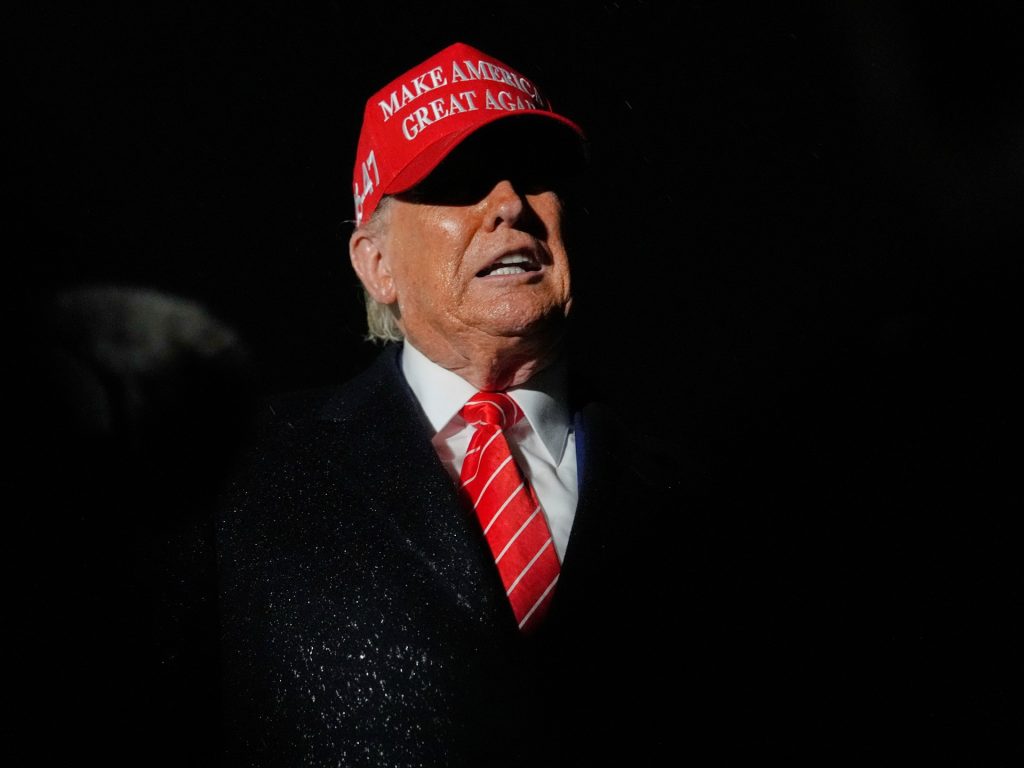
In a news statement this week, the White House cherry-picked personal income tax-related elements in the “big, beautiful bill”, the wide-ranging tax and spending bill being pushed by United States President Donald Trump, and claimed that, in opposing the legislation as a whole, the Democratic Party was opposed to every individual item contained within it. Such a tactic is misleading, particularly since the White House cited measures in the bill that have been championed by Democrats to improve the lives of Americans and are not the reasons the Democrats have given for opposing the “big beautiful bill”. Here’s a fact-check of what the White House claims Democrats oppose: “They’re opposing the largest tax cut in history, which will put an extra $5,000 in their pockets with a double-digit percent decrease to their tax bills. In fact, Americans earning between $30,000 and $80,000 will pay around 15% less in taxes.” The specifics of the tax bill have not been finalised. In its current form, it would cut taxes by an average of 2.4 percent, for middle-income households, according to analysis by the Tax Policy Center. While it is a significant tax cut, it is not the biggest in history. That was under Ronald Reagan in 1981 at 2.9 percent. Advertisement It is accurate that there will be a double-digit percentage decrease in tax bills, at least in the immediate term, at a little more than 11 percent across all tax brackets. It is also true that people earning between $30,000 and $80,000 will pay 15 percent less, according to the Non-Partisan Joint Committee on Taxation. “They’re opposing NO TAX ON TIPS for the millions of Americans who work in the service industry and NO TAX ON OVERTIME for law enforcement, nurses, and more.” This is true only in their opposition to Trump’s tax and spending bill. Democrats and Republicans have supported the concept of no tax on tips. Both Donald Trump and the Democratic presidential nominee Kamala Harris pledged to do so on the campaign trail. Senate Democrats backed the No Tax on Tips Act, passed by the US Senate on May 20. The bill, authored by Republican Senator Ted Cruz of Texas, was co-sponsored by notable Democrats, including Jacky Rosen of Nevada and passed unanimously. “They’re opposing historic tax cuts for senior citizens” Outside of the “big beautiful bill”, Democrats have generally not opposed tax cuts for seniors. Many Democrats have championed legislation that would expand tax cuts for seniors. California Democrat Jimmy Panetta co-sponsored a Republican led bill that would increase the standard deduction for adults over the age of 65 by $4,000. In 2024, House Democrats introduced the “You Earned It, You Keep It Act”, which would effectively eliminate taxes on social security benefits. The bill, however, has never made it past committee. “They’re opposing a boost to the child tax credit.” Again, they are opposing Trump’s “big beautiful bill”, not objecting to the child tax credit. In fact, Democrats have long pushed to expand the child tax credit. In April, Senate Democrats, including Georgia’s Raphael Warnock and Colorado’s Michael Bennett, introduced legislation that would expand the child tax credit. The bill would increase the tax credit, from $2,000 where it currently stands, to $6,360 for newborns, $4,320 for children ages one to six and $3,600 for children six to 17, permanently. Advertisement While the “big beautiful bill” would also increase the child tax credit, it would do so only by $500. That temporary increase is meant to last through 2028 and will revert to $2,000 in 2029. “They’re opposing new savings accounts for newborns and the chance for children across America to experience the miracle of compounded growth.” In the “big beautiful bill”, House Republicans introduced new savings accounts for children. The accounts would include a $1,000 handout for every child born between January 1, 2025 and January 1, 2029. Democrats have not only been supporters of the idea for savings accounts for newborns, but prominent Democrats actually championed it. In 2018, Cory Booker of New Jersey introduced the American Opportunity Accounts Act, which would also give $1,000 to newborns and up to $2000 in annual contributions. He reintroduced the bill again in 2023. “They’re opposing expanded access to childcare for hardworking American families.” This appears to be false. The White House link refers to the Paid Family and Medical Leave Credit, not child care access. Trump’s bill offers up to 12 weeks of paid leave for employees who have worked a year and earn $57,600 or less. While that gives parents more time at home, Democrats have focused on expanding access to child care, including universal pre-K. In 2023, Republicans opposed a Democratic plan to keep child care centres open that struggled in the early days of the COVID-19 pandemic. “They’re opposing historic border security to keep their communities safe.” Last year, Trump pressured Republicans to vote against a bipartisan border security bill, a move that reportedly helped Trump’s chances of winning in November 2024. Democrats have opposed Republican plans to use US military bases for migrant detention, arguing that it misuses Department of Defense resources. Democrats have long opposed border wall funding, including during Trump’s first term. Advertisement A 2018 Stanford University analysis estimated that a border wall would reduce migration by just 0.6 percent. Despite this, the “big beautiful bill” allocates more than $50bn to complete the wall and maritime crossings, $45bn for building and maintaining detention centres, and $14bn for transportation. “They’re opposing expanded health savings accounts that give Americans greater choice and flexibility in how they spend their money.” This is sort of true. Democrats have not been huge proponents of health savings accounts. The belief is that healthcare savings accounts do not help the socioeconomically disadvantaged, who may not have the financial resources to contribute to the accounts. Democrats have also objected to other cuts to healthcare in the bill, including the potential $880bn that could be cut from essential government programmes like Medicaid. “They’re opposing scholarships that empower Americans
US judge halts deportation of family of suspect in pro-Israel rally attack

A federal court says removing the wife and children of Mohamed Soliman without due process could cause ‘irreparable harm’. A United States judge has temporarily blocked the deportation of family members related to a suspect accused of throwing Molotov cocktails at a pro-Israel rally in Boulder, Colorado. The ruling on Wednesday came after the administration of President Donald Trump arrested the wife of Mohamed Soliman and their five children in an effort to deport them. Judge Gordon Gallagher wrote that Soliman’s wife, Hayam El Gamal, and her children cannot be removed from the country as long as his order stands. “Moreover, the Court finds that deportation without process could work irreparable harm,” the judge said. El Gamal, who has not been charged with a crime, had filed a legal petition for her release. Soliman, meanwhile, has been charged with a federal hate crime over the attack on Sunday, which injured 12 people. It is unclear if the Trump administration has any evidence that Soliman’s relatives committed wrongdoing, or if they were simply targeted for their association with him. Authorities have indicated that Soliman appears to have acted alone in the attack. Advertisement Still, Trump officials signalled they would take an aggressive approach to investigating and deporting individuals they perceived to be linked to “terrorism”. “In light of yesterday’s horrific attack, all terrorists, their family members, and terrorist sympathizers here on a visa should know that under the Trump Administration we will find you, revoke your visa, and deport you,” Secretary of State Marco Rubio said in a social media post on Monday. The Department of Homeland Security (DHS) confirmed on Tuesday the detention of Elgamal, her three daughters and her two sons, four of whom are minors. “We are investigating to what extent his family knew about this heinous attack, if they had knowledge of it, or if they provided support to it,” Homeland Security Secretary Kristi Noem said in a video posted online. “Justice will be served.” According to DHS, Soliman and his family arrived in the US on temporary visas in 2022 before applying for asylum. Soliman’s visa expired in 2023. Media reports indicate that El Gamal, meanwhile, applied for an employment visa: She has a background as a network engineer. Critics say the tactic of penalising the relatives of a criminal suspect is a form of unlawful collective punishment. In the West Bank, for instance, human rights groups have denounced Israeli operations that demolished the homes of Palestinians related to suspects in armed attacks. The attack in Colorado has been linked to Israel’s war on Gaza, which United Nations experts have described as a genocide. The suspect allegedly yelled “Free Palestine” during the fire-bombing. Advertisement The Washington-backed war has also sparked other violent incidents on US soil. The incident in Colorado followed the killing of two Israeli Embassy staff members in Washington, DC, last month. In October 2023, a six-year-old Palestinian boy was stabbed to death in the Chicago area in another crime linked to the war. The 73-year-old suspect reportedly told the boy’s mother that Muslims “must die” as he attacked them. He was sentenced to 53 years after being convicted of murder and hate crimes. Weeks later, three Palestinian American students were shot and severely wounded in Vermont. The war on Gaza has killed at least 54,607 Palestinians, according to health officials. Adblock test (Why?)
Donald Trump announces US travel ban on people from 12 countries
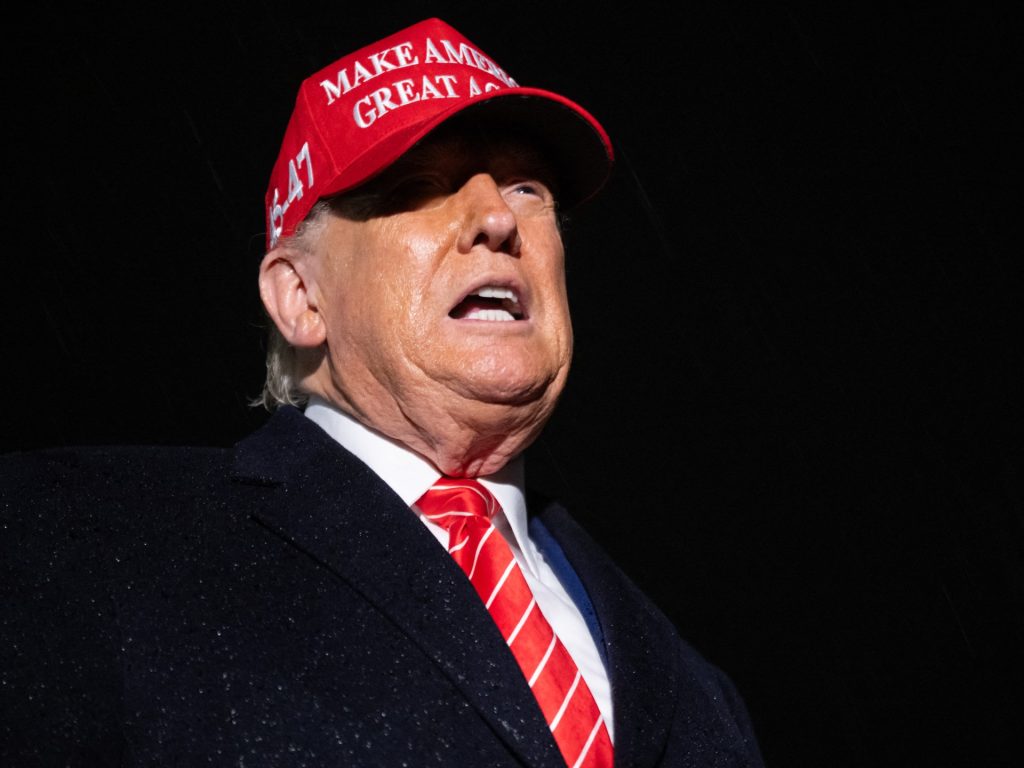
United States President Donald Trump has signed an executive order imposing a full travel ban on people from 12 countries and restricting the citizens of seven other countries, the White House said. The banned countries include Afghanistan, Chad, Congo, Equatorial Guinea, Eritrea, Haiti, Iran, Libya, Myanmar, Somalia, Sudan and Yemen. In addition to the ban, which was announced on Wednesday and takes effect on Monday, there will be heightened restrictions on people from Burundi, Cuba, Laos, Sierra Leone, Togo, Turkmenistan and Venezuela. “I must act to protect the national security and national interest of the United States and its people,” Trump said in his order. In a video message released by the White House, Trump said the recent attack on a pro-Israel rally in Boulder, Colorado had “underscored the extreme dangers posed to our country by the entry of foreign nationals who are not properly vetted”. The president said there were “millions and millions of these illegals who should not be in our country”. Advertisement “We will not let what happened in Europe happen to America,” he said, adding, “very simply, we cannot have open migration from any country where we cannot safely and reliably vet and screen those who seek to enter the United States”. “We will not allow people to enter our country who wish to do us harm.” “We cannot have open migration from any country where we cannot safely and reliably vet and screen… That is why today I am signing a new executive order placing travel restrictions on countries including Yemen, Somalia, Haiti, Libya, and numerous others.” –President Trump pic.twitter.com/ER7nGM4TO2 — The White House (@WhiteHouse) June 4, 2025 During his first term in 2017, Trump issued an executive order banning travel to the US by citizens of seven predominantly Muslim countries: Iran, Iraq, Libya, Somalia, Sudan, Syria and Yemen. People from the named countries were either barred from getting on their flights to the US or detained at US airports after they landed. Those affected included tourists, people visiting friends and family, students and faculty members at US institutions, and businesspeople. The order, often referred to as the “Muslim ban” or the “travel ban”, was reworked amid legal challenges until a version was upheld by the Supreme Court in 2018, which banned categories of travellers and immigrants from Iran, Somalia, Yemen, Syria and Libya, plus North Korean and some Venezuelan government officials and their families. Trump defended his initial travel ban on national security grounds, arguing that it was aimed at protecting the US and claiming that it was not anti-Muslim. However, Trump had called for a travel ban on Muslims during his first campaign for the White House. Advertisement Trump moves to block foreign students studying at Harvard Trump also signed an executive order on Wednesday to suspend the entry of foreign nationals seeking to study or participate in programmes at Harvard, accusing one of the US’s most prestigious universities of having “a history of concerning foreign ties and radicalism”. The order directs the US State Department to “consider revoking” existing academic or exchange visas of any current Harvard students “who meet the Proclamation’s criteria”. Last month, the US State Department ordered all its consular missions overseas to begin additional vetting of visa applicants looking to travel to Harvard University for any purpose, according to an internal cable seen by Reuters. Harvard has accused the US administration of retaliating against it for refusing to accede to Trump’s demands to control the school’s governance, curriculum and the ideology of its faculty and students. The visa restrictions follow earlier moves to freeze billions of dollars in grants and other funding to Harvard, end the university’s tax-exempt status and to open an investigation into whether it discriminated against white, Asian, male or straight employees or job applicants. Last month, the administration revoked Harvard’s ability to enrol foreign students. While that move was blocked by a federal court in Boston, Trump’s latest order invokes a different legal authority, the Associated Press news agency reports. Adblock test (Why?)
Indian Premier League cricket championship sparks deadly stampede

NewsFeed At least 11 people died in a stampede outside a cricket stadium in Bengaluru as crowds gathered to celebrate Royal Challengers Bengaluru’s first Indian Premier League title. Footage shows fans scaling fences and swarming the stadium. Published On 4 Jun 20254 Jun 2025 Adblock test (Why?)

